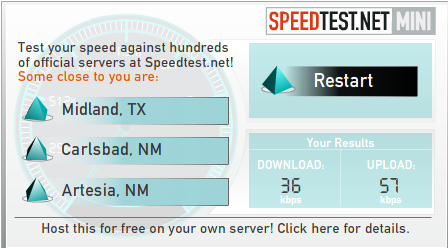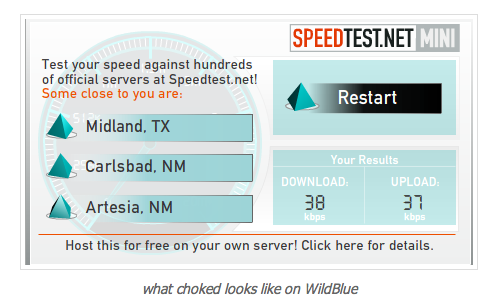As Judie shared last week in a post, she has been having a terrible time getting and staying connected thanks to the WildBlue, a company that makes AT&T Wireless look good! Well over a week after being throttled, Judie still has a connection speed that is at or below dial-up.

Judie’s internet speeds as of 05/23/11
Because she is in a rural area that is not covered by 3G, and because she doesn’t have a phone line (and even if she did, DSL is not available), and because “beamed” broadband internet will not work due to her home’s location (she is not in a clear path of the wireless tower), her broadband choices are limited to… well actually she found out that for now at least, she has no choice. Yes, for Judie and Kevin it is basically WildBlue or nothing. Nice anniversary present for the happy couple don’t you think? =P
It got me thinking about the ramifications of our Internet companies beginning to flex their muscle, and the picture it paints isn’t pretty. After all, my Apple TV no longer stores content. It streams it with just a bit of any given episode being cached for smoother playback. A couple of movies a month, and Judie will be dead in the water again. We both listen to tons of music. Can Judie even consider using Amazon, Google’s or Apple’s streaming music service? No way!! And I have yet to watch an episode of Game of Thrones on anything but my iPad. There is no way that would be an option for Judie while using WildBlue, which meters and chokes when a threshold is reached.
But it gets worse!
All this comes at a time when Apple has made a huge move to software distribution from the cloud. It works great for me, but for Judie and anyone else who is on metered data plans??
The Xcode download is 4.25 GB in size. If OS X Lion is distributed through the App Store, Judie and anyone else who has to watch their download amounts is going to have an issue. And the list goes on and on.
It is more than a bit clear that the big technology and media companies have finally gotten their act together, and they are providing some great solutions for streaming all kinds of content. Unfortunately they seem to be increasingly out of step with what some of the Internet companies we have grown to rely upon will allow.



X-Code is a great example – not only is it 4.25GB, but EVERY ITERATION is 4.25GB! So if you grabbed X-Code 4 it was 4.25GB, then 4.01 was 4.25GB, and 4.02 was also 4.25GB! Add to that the iOS updates of 675MB that have hit three times in the last couple of months across iPhone, iPod Touch and iPad … and you will quickly break 20GB in Apple updates alone!
It’s interesting how these things seem to be working at odds with one another. And unfortunate. I understand the Apple model of including “the whole thing” when you do the downloads, because it helps eliminate the problems that partial package updates create. How many times have you done an update and then had to go back and get the full installer because something got skipped in the partial / delta update? It happens to people a LOT! This is why I am NOT as enamored of OTA (partial/delta) updates as some people are. I like the stability offered by Appe’s approach with full updates when updateing iPod/iPad/iPhone firmware, or the App Store (Mac App Store). But if you are living in a metered world this can quitkly become a nightmare, as in Judie’s case!
If we have choices, we can vote with our dollars – opting for carrier that offer reasonable (or no) caps. But what can Judie do? She’s kind of stuck. I do think that we can make these kinds of carriers aware of the problems they are creating and make sure they understand that it goes against the grain of the industry. Will that hep? I don’t know. If they are a sole-source supplier – i.e. no other supplier exists in the market – then maybe, maybe not. But I think raising awareness everywhere we can is a good start!
Choices are lacking even for those who don’t live on an isolated compound in the middle of West Texas. Most people in the USA have one or two options for true broadband service, plus satellite. In San Angelo, if the (one and only) cable company messes up and people want to jump ship, the only viable option is the local (one and only) DSL provider. DSL is almost always slower than cable, and both members of this duopoly know they have no particular incentive to offer non-evil service. Captive audiences don’t really have much ability to vote with their wallets.